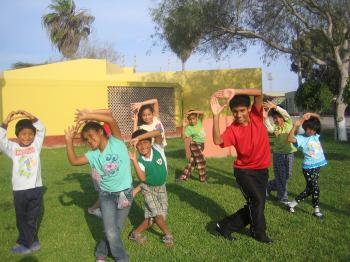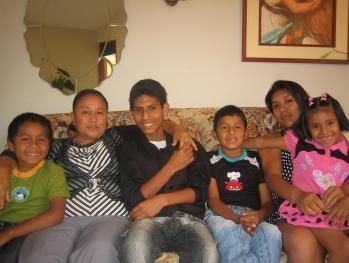Internal migration in search of work and a better life
-67183_jpg.jpg?width=800)
Chiclayo, located near the Pacific coast in northern Peru, is the capital city of the Lambayeque region. It has a warm and dry desert climate, but its inhabitants have successfully irrigated and farmed the land ever since the time of the Moche civilisation (100 to 800 AD). Chiclayo is Peru’s fourth largest city.
Chiclayo has always been a strong agro-industrial centre in northern Peru and therefore has a massive influx of migrants, many of them from poorer highland regions. In fact, Chiclayo has a migrant population of 46.5 per cent. This intensive urbanisation brings problems, however, such as inadequate housing and sanitation. And this in turn puts the children of these migrant families in an environment where their healthy development is severely endangered.
In addition, when families migrate, support networks break down and single parents in particular often have no one to look after their children while they are out working. This means that children have to learn to fend for themselves at an age when they should be protected and nurtured.
Children need support and guidance to break the cycle of poverty
Another problem is that, more often than not, people do not find formal work once they have migrated. A life of illegal work, for example as street vendors, is therefore their only option. They are vulnerable to health hazards, violence and exploitation in the streets and, since their activities are illegal, even the police cannot provide protection. And it is always the children who suffer most from this precarious lifestyle. To help the family survive, many also have to work on the streets, selling merchandise or shining shoes.
When parents cannot afford to formalise their business or do not hold the necessary qualifications to get a formal job, their children become victims of the cycle of poverty. They, too, miss out on education as they have to contribute to the family income. Nor do they receive the health care and loving family environment every child deserves.
What we do in Chiclayo

SOS Children’s Villages began its work in Chiclayo in 1983.
Strengthen Families: The social centres here offer a family strengthening programme to support the local community. Its services include childminding centres, which enable parents, particularly single mothers, to leave their children in safe hands while they go out to make a living.
The activities here are organised by the community itself, with SOS Children’s Villages providing training and support.
Care in SOS families: For children who are no longer able to live with their parents, SOS families provide a loving and secure home where children live with their brothers and sisters, affectionately looked after by their SOS parent. Some SOS families live alongside other families in different neighbourhoods throughout the town.
Support for young people: When young people are ready to leave their SOS family in order to pursue further education or vocational training, the SOS Youth Programme provides shared flats in town. Qualified counsellors are available on-site to assist young people in planning their future, learning to shoulder responsibility and increasingly making their own decisions.